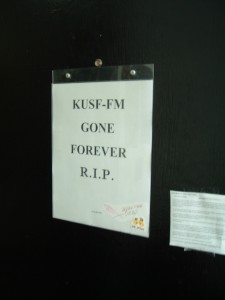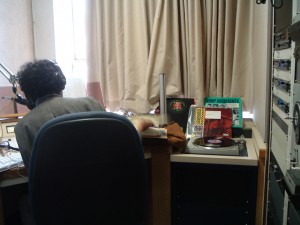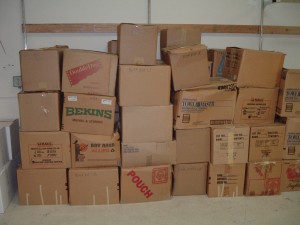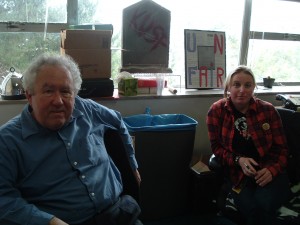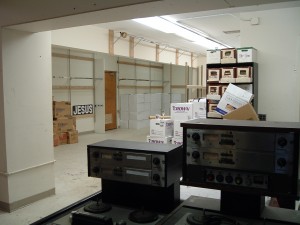Just four months after University of San Francisco (USF) pulled the plug on KUSF’s terrestrial broadcast, the former KUSF studio in Phelan Hall has been dismantled.
When I stopped by the station on May 17, DJs were still broadcasting from the now online-only KUSF.org. I was told that May 18th would be the final day of online-only broadcasts from the Phelan Hall studio. As movers worked to haul away boxes full of vinyl records, CDs, and decades worth of station equipment (college radio operations at USF had been housed in Phelan Hall since KUSF’s beginnings as a carrier current station in 1963), KUSF General Manager Steve Runyon and KUSF Fundraising Coordinator Miranda Morris spoke about the future of the online-only station.
According to Runyon, the station was being forced to move to smaller quarters in another building on the USF campus. He expected that KUSF.org would be off the air for at least a month, as they would have to entirely rebuild a new studio in their new building. He added that, “KUSF online is still feeding audio to keep our Live 365 streaming active. We expect to again have studio availability in mid to late summer.” The new studio will be located on the 4th floor of Cowell Hall. According to Runyon, “It still has to be designed and built with extremely limited resources. It is presently an academic seminar room.”
Since the new location has less storage space, they were in the process of purging files and paperwork when I visited.
Runyon said that they needed to cull down miscellaneous paperwork in order to fit into 3 filing cabinets, compared with the 15 cabinets they used in Phelan Hall. He acknowledged that this wasn’t the first time that the station has had to dispense with archival material. In the past various classical recordings and audio tape archives have been trashed when the university needed the space. He added that in the new location there will be less room for music storage, so much of it will need to be stored off campus. The hope is that they will gradually be able to digitize their large vinyl collection. According to Runyon, KUSF will be moving to “various rooms in Cowell and Kalmanovitz Halls.” He added that the “future location of KUSF’s record/CD collection is undecided at present.”
Ever since January 18, when USF announced that it would be selling KUSF’s 90.3 FM license and transmitter to Classical Public Radio Network (CPRN), the KUSF studio and online-only broadcast have been a shadow of their former selves. Most DJs fled the station and have been working under the mantle of Save KUSF (with many DJing at KUSF in Exile, hosted by WFMU) in order to fight the station sale.
Only a handful of DJs stuck around the old KUSF, so its online-only station has only had a few DJs since January 18. By May 17, only about 4 or 5 DJs were on the air at KUSF.org and the station was doing live shows for only about 10 hours a day, with the rest of the broadcast coming from an iPod. Runyon said, “we don’t have a listening audience, basically.” He added that, “there’s no morale left whatsoever among students or staff.”
It was sad to see the station in ruins and also obvious to me that it must be heartbreaking for Runyon to see the demise of KUSF. He launched the station back in 1977 and he’s proud of all of the achievements over the years. He pointed out that KUSF attracted many students to University of San Francisco and speculated that the university would lose donations from alumni disappointed about the station sale.
As I toured KUSF on May 17, the mood was melancholy and I couldn’t help but remember my first visit 2 years ago and a subsequent trip there last summer when the studio was full of life and the surrounding rooms were full of records, CDs, framed gold records, and historical artifacts. It was a depressing scene and a shot of reality about USF’s disinterest in KUSF’s future.
Nearly two weeks ago, as former KUSF volunteers started to realize the fate of the old studio, another letter was sent to the FCC regarding Friends of KUSF’s “Petition to Deny” the assignment of the KUSF license to CPRN. In support of the Petition to Deny, this latest letter dated May 26 provides a supplemental declaration. The declaration from KUSF’s former Personnel Co-Director Claudia Mueller argues that on May 22, 2011, “The entire studio space of KUSF 90.3 FM in Phelan Hall…that includes former production studio C, broadcasting studio B and live studio A have been completely dismantled. No studio equipment that enables any form of broadcasting is left in the premises of KUSF 90.3 FM.”
This statement from Mueller is meant to support the argument in the Petition to Deny that USF has ceded control of its license prematurely and is in violation of FCC rules regarding its ability to originate programming from its main studio. In fact, several recent FCC actions confirm the strong stance that the FCC has taken as far as studio control goes. In the University of San Francisco’s Opposition to the Petition to Deny, lawyers argued that, “Programming on KUSF is originating from the [sic] CPRN’s studios and is subject to the University’s control. The Commission’s Rules do not require programming to originate from a station’s main studio. The main studio must have the ability to originate programming. KUSF retains full ability to broadcast from its main studio on the University campus.”
With the dismantling of the KUSF studio at USF in mid-May, it’s pretty clear that KUSF is in violation of the FCC’s rules about maintaining a main studio. So far there’s no word from the FCC on this, but Save KUSF and Friends of KUSF are hoping for a hearing to review all of these potentially problematic moves by USF. According to a press release from Save KUSF this week, “Peter Franck one of the attorneys for Friends of KUSF commented: ‘This action by the University is one more action which demonstrates that the parties to this whole transaction act as if the FCC was nothing but a rubber stamp. In fact approving this license transfer would violate the FCC’s duty to act in the Public Interest, as we will point out further if the FCC grants our petition to set the whole matter for a public hearing.'”
It will be interesting to hear how both USF and the FCC respond.
***
Complete Radio Survivor coverage about the proposed sale of KUSF can be found here. I also wrote about my reaction to the KUSF shut down and to the Save KUSF Multi-Station Live Broadcast on Spinning Indie. My article chronicling my KUSF field trip 2 years ago is housed there too. For more on the bigger picture of college radio station sell-offs, see my December 2009 piece “Cash-strapped Schools Turn Their Backs on College Radio“. And, for a quick overview of the situation at KUSF, see my article, “The Story Behind the KUSF Shutdown” on PopMatters.

